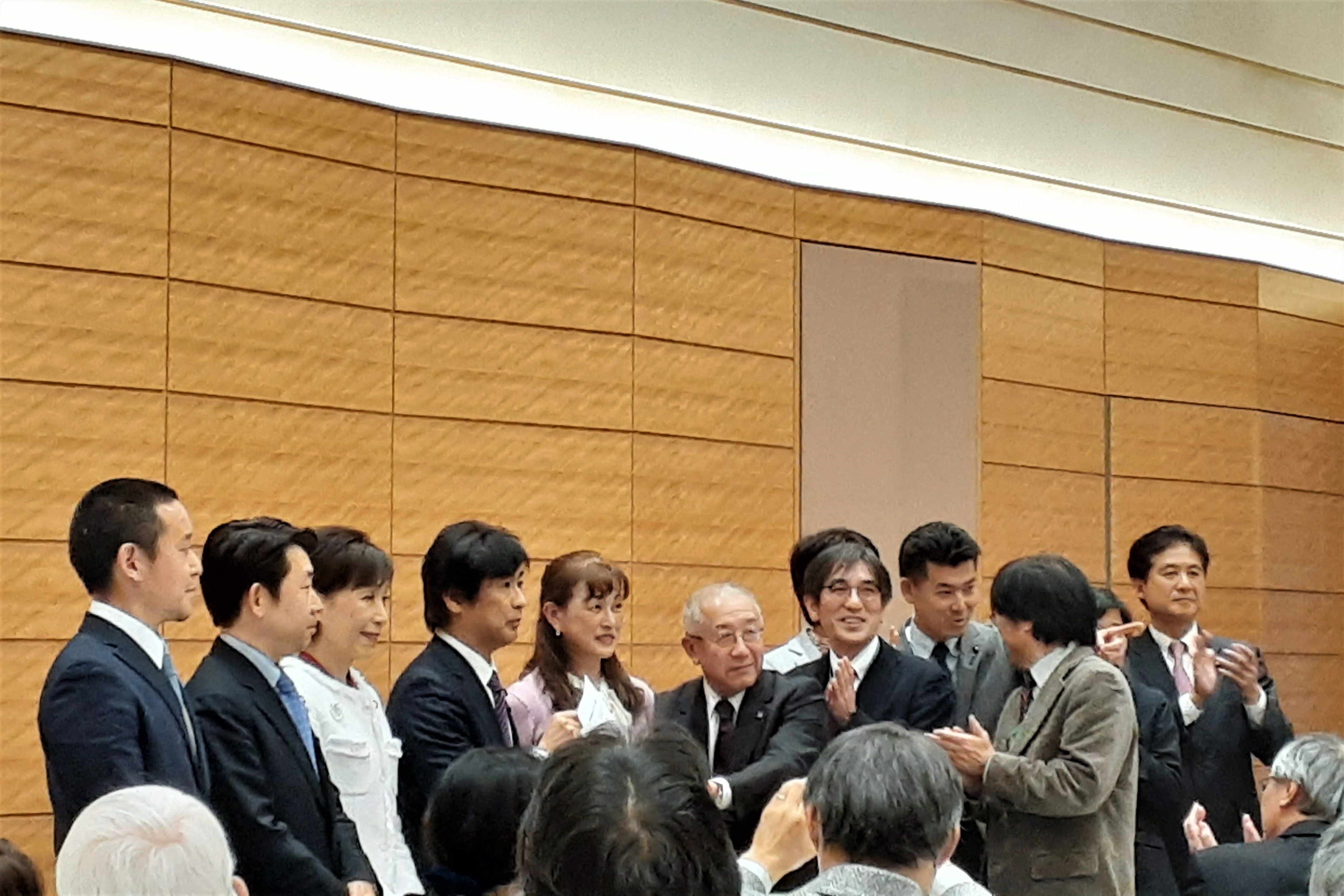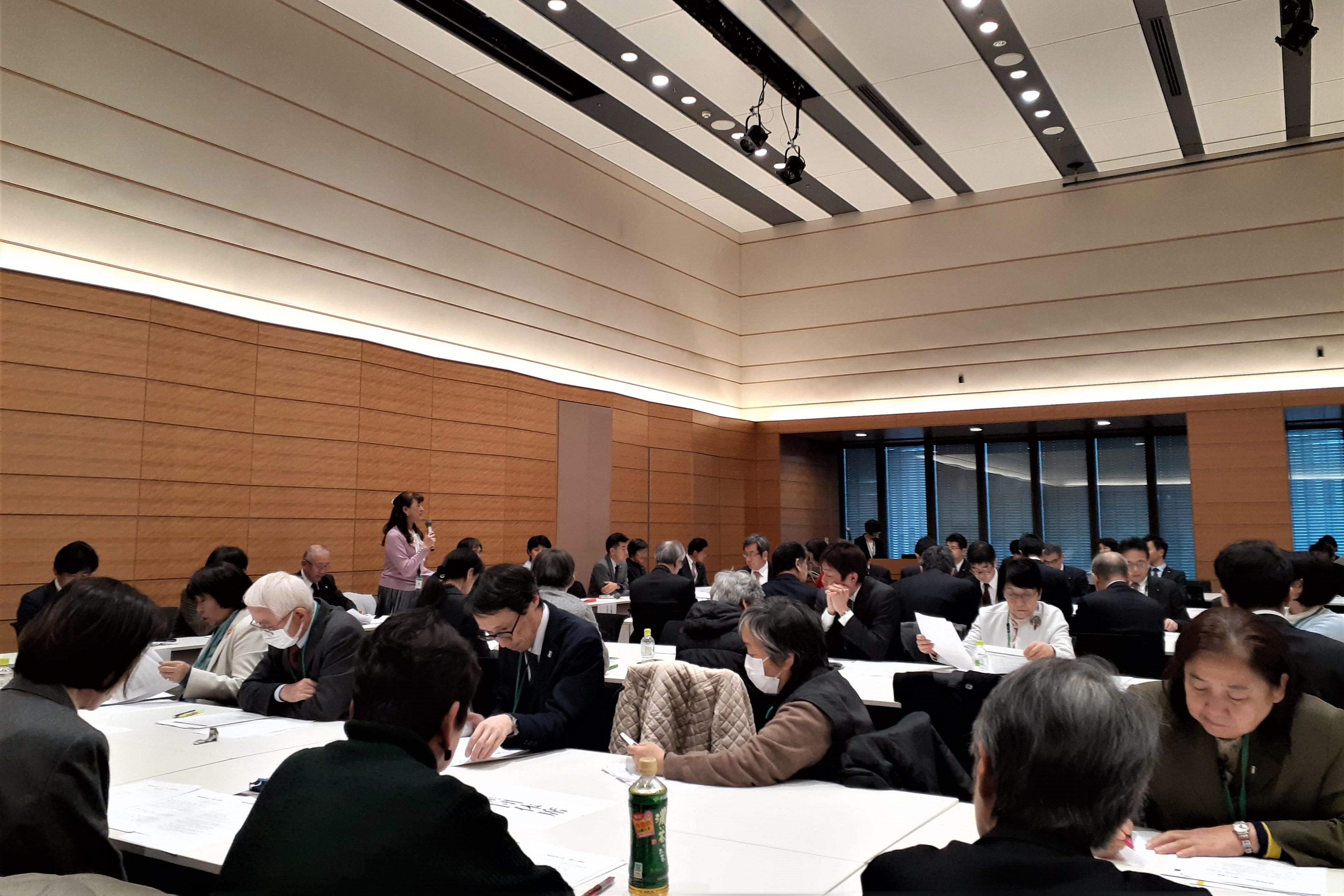[HGPI Policy Column] No. 8 – From the Dementia Policy Team – Creating Publicness with the Basic Law for Dementia
date : 3/10/2020
Tags: Dementia, HGPI Policy Column
![[HGPI Policy Column] No. 8 – From the Dementia Policy Team – Creating Publicness with the Basic Law for Dementia](https://hgpi.org/en/wp-content/uploads/sites/2/photo1_202002.jpg)
Key points
・A meeting to discuss the Basic Law for Dementia was held at the Diet on February 6th, 2020.
・There, a discussion based on implementing a wider range of opinions from those most affected was held in a nonpartisan manner for the future resubmission of the law.
・To build a dementia-friendly society, those who were previously uninvolved with dementia are now more important than ever.
In our previous column, we discussed Scotland’s Post Diagnostic Support (PDS) system and its potential to be one solution to what are known as Blank Periods. We said that Blank Periods overlap with periods when it is critical for people with dementia to plan their future lifestyles and that we must provide support during these periods to enable people to exercise their right to self-determination. Because the PDS system emphasizes the promotion of community development, we introduced efforts to generate community resources undertaken alongside efforts to provide support to people with dementia and their families.
This column addresses a rather recent topic. We have already mentioned the Basic Law for Dementia several times. This law was submitted to ruling party lawmakers in the Diet as a legislation by Diet members in June 2019 and was discussed in Column No. 4 and 5, entitled “Soon to Be Enacted – The Basic Law for Dementia” and “Considering the Basic Law for Dementia from the Perspective of Local Autonomy.” In this column, we will discuss a Diet meeting on the Basic Law for Dementia that was held on February 6th, 2020.
Diet Meeting on the Basic Law for Dementia – Overview
The meeting was jointly held by the Association of People with Dementia, their Family Members, and Supporters (composed of four organizations: Alzheimer’s Association Japan, the National Family & Supporter Council for Working Age Dementia, the Man Nursing and Support Person’s Nationwide Networks, and the Dementia with Lewy Bodies Support Network) and the Japan Dementia Working Group. There, the hosts and Diet members in attendance gave statements and the hosts submitted a written request to the Diet members. Greetings were also given by guests mainly from academia, who shared expectations and identified challenges for the bill.
Many people from the hosting parties requested lawmakers carefully draw upon many stories and opinions of people with dementia or their family members when formulating laws for dementia to enable people living with dementia, their family members, and each and every citizen who has the potential to develop dementia in the future to live with peace of mind.
Specific proposals included adding a clear mention of “human rights” in the law, avoiding the phrase “dementia prevention” in favor of “preparing for dementia,” and obligating prefectural and municipal governments to formulate dementia plans instead of obligating them to make efforts to formulate plans. They also stressed the importance of decreasing burdens on family members, who can be considered among the parties most affected.
Over 30 Diet members from various parties participated in the meeting, demonstrating strong interest in dementia. Although many Diet members initially agreed to hold a nonpartisan discussion, we observed that opinions split many times on various topics such as the necessity to draft a bill rapidly. Some were of the opinion that it is best to start by quickly creating a law that can serve as the foundation of future efforts followed by having multiple discussions to amend or expand that law. However, others were of the opinion that the issue must be approached in a more prudent fashion by advancing only after having multiple detailed discussions with the various stakeholders who will be affected by the bill.
In response to the aforementioned proposals from the hosting parties, participants pointed out various issues including the difficulty of coordinating with the Cabinet Legislation Bureau over the use of the phrase “human rights” in the law or reluctance towards obligating prefectural and municipal governments to formulate plans. (For more information on that subject, please see Column No. 5, “Considering the Basic Law for Dementia from the Perspective of Local Autonomy.” In that column, I expressed the view that we should obligate them to make efforts to formulate plans from the perspective of policy effectiveness).
Mr. Norihisa Tamura, former Minister of Health, Labour and Welfare and the person who coordinated the previously submitted Basic Law for Dementia, admitted that there were many points in the current draft that must be revised. He also mentioned the possibility of resubmitting the law based on nonpartisan discussions.
Summary
Based on the recent floor meeting and conference involving both ruling and opposition parties, nonpartisan discussions on the Basic Law for Dementia are expected to deepen in the future. As was mentioned during the event, this law is by no means only for people currently living with dementia and their families. It will affect all people living in Japan who will develop dementia or not develop dementia regardless of their age, gender, or nationality. It is my belief that this law is even more important for people who have not had much contact with dementia in the past.
In a public opinion survey conducted by the Cabinet Office in December 2019, 61.6% of respondents said that they have had contact with someone with dementia in the past. Among them, 47.7% said that they have or had a relative with dementia. Although the number of people who feel close to dementia is gradually increasing, approximately 40% of people have had no previous contact with a person with dementia. Those who have had a relative with dementia – myself including – are often left with the strong impression that dementia is an isolated incident that only involves one’s own family. It is possible that many only realize the diversity of dementia after becoming involved with people with dementia who are not relatives and learning about their situations and needs.
To build a society that is truly dementia-friendly, the question of how much to deepen the understanding of people who have had no contact with dementia is extremely important. In a 2005 publication, Prof. Kosuke Nasu defined “publicness” as something that establishes man-made relationships between multiple differing types of cooperation rather than natural unity and homogeneity based on collective beliefs, and that it can be achieved through public policy. Of course, this is the first time a law specifically addressing dementia has been drafted in Japan. To achieve publicness in the field of dementia, the Basic Law for Dementia has great expectations and responsibilities placed upon it.
===
[Reference] Request Concerning the Basic Act for Dementia (Full Text)
We are a nationwide organization that has come together with the goal of building a society in which people with dementia and their supporters can continue living full lives in their own communities while maintaining their identities, their hope, and their dignity. We sincerely wish to accelerate the transition to a society in which those of us currently living with dementia, the many of us who will develop dementia in the future, and everyone who will live in the coming era can live with hope. We therefore submit the following request to every political party and all members of the Diet.
1. The Basic Law for Dementia will provide the legal foundation for efforts to make policy for dementia more substantial and to build a better future for those most affected. Please enact it as soon as possible.
2. In the past, we have submitted proposals entitled “Our Expectations and Hopes for the Basic Law for Dementia,” and “A Joint Proposal on Dementia – Building a More Dementia-Friendly Society.” We sincerely request those who draft the Basic Law for Dementia first gather sufficient opinions from those most affected by dementia such as people with dementia and their family members, and reflect those opinions in the Law.
===
[Reference materials]
Cabinet Office. 2019. “Public Opinion Survey on Dementia.”
Nasu, Kosuke. 2005. “The Prototype of Political Thinking: Where Did Policy Studies-Based Thinking Originate?” In Adachi, Yukio, “What is Policy Studies-Based Thinking – Experiments in Public Policy Fundamentals,” Chapter 8. Keiso Shobo Publishing.
About the author
Shunichiro Kurita (HGPI Senior Associate; Steering Committee Member, Designing for Dementia Hub)
Top Research & Recommendations Posts
- [Policy Recommendations] The Path to a Sustainable Healthcare System: Three Key Objectives for Public Deliberation (January 22, 2026)
- [Research Report] Perceptions, Knowledge, Actions and Perspectives of Healthcare Organizations in Japan in Relation to Climate Change and Health: A Cross-Sectional Study (November 13, 2025)
- [Research Report] The 2025 Public Opinion Survey on Healthcare in Japan (March 17, 2025)
- [Policy Recommendations] Reshaping Japan’s Immunization Policy for Life Course Coverage and Vaccine Equity: Challenges and Prospects for an Era of Prevention and Health Promotion (April 25, 2025)
- [Research Report] The 2023 Public Opinion Survey on Satisfaction in Healthcare in Japan and Healthcare Applications of Generative AI (January 11, 2024)
- [Research Report] AMR Policy Update #4: Cancer Care and AMR (Part 1)
- [Policy Recommendations] Developing a National Health and Climate Strategy for Japan (June 26, 2024)
- [Public Comment Submission] “Assessment Report on Climate Change Impacts in Japan (Draft Overview)” (December 24, 2025)
- [Research Report] Survey of Japanese Physicians Regarding Climate Change and Health (December 3, 2023)
- [Research Report] The Public Opinion Survey on Child-Rearing in Modern Japan (Final Report) (March 4, 2022)
Featured Posts
-
2026-01-09
[Registration Open] (Hybrid Format) Dementia Project FY2025 Initiative Concluding Symposium “The Future of Dementia Policy Surrounding Families and Others Who Care for People with Dementia” (March 9, 2026)
![[Registration Open] (Hybrid Format) Dementia Project FY2025 Initiative Concluding Symposium “The Future of Dementia Policy Surrounding Families and Others Who Care for People with Dementia” (March 9, 2026)](https://hgpi.org/en/wp-content/uploads/sites/2/dementia-20260309-top.png)
-
2026-02-05
[Registration Open] (Webinar) The 141st HGPI Seminar “Current Status and Future Prospects of Korea’s Obesity Policy: Voices of People with Lived Experience in Policy Promotion” (March 3, 2026)
![[Registration Open] (Webinar) The 141st HGPI Seminar “Current Status and Future Prospects of Korea’s Obesity Policy: Voices of People with Lived Experience in Policy Promotion” (March 3, 2026)](https://hgpi.org/en/wp-content/uploads/sites/2/hs141-top-1.png)
-
2026-02-06
[Research Report] AMR Policy Update #5: Cancer Care and AMR (Part 2)
![[Research Report] AMR Policy Update #5: Cancer Care and AMR (Part 2)](https://hgpi.org/en/wp-content/uploads/sites/2/HGPI_20260204_AMR-Policy-Update-5.png)






